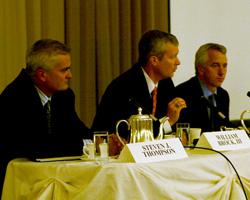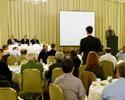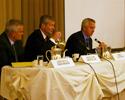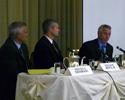News feature, November 9, 2007
Experts discuss the legal side of doping in sport
By Mark Zalewski, North American Editor in Chicago

|
The sports law committee of the Chicago Bar Association hosted a panel discussion regarding legal issues involved with doping in sport on Tuesday. Moderated by Lester Muson, a well-known American sports writer with ESPN and himself a lawyer, the panel consisted of Bill Bock, the newly appointed general counsel for the US Anti-doping Agency (USADA), Steven J. Thompson, a frequent defense counsel to athletes in drug testing cases and Greg Lemond, three-time Tour de France winner and advocate against doping in cycling.
The seminar, entitled Legal and Ethical Issues of Testing for Performance Enhancing Drugs in Sport, was focused for the audience, made up of association lawyers continuing their required ongoing professional education. However, the discussion by the panelists included interesting angles on the issue - both from the enforcement and the defense sides - as well as Lemond continuing his public fight against doping.
Bill Bock was the first to speak, and much of his presentation was of a general nature - trying to bring the audience to a common level of understanding of doping in sport. His examples centered mostly on U.S. track and field athletes that involved the BALCO scandal, which spawned US Attorney and Congressional investigations. Bock showed evidence obtained by USADA from confessed performance enhancing drug users - including disturbing emails from BALCO's Victor Conte and detailed calendars of drug regiments from Kelli White, the disqualified world champion runner.
Bock stressed that while USADA is often portrayed in a negative light by athletes, the body is there for athlete's protection by ensuring a level playing field.
"They take no special pleasure in catching athletes. My experience in working with them is positive."- Steven Thompson believes USADA isn't unreasonable |
Speaking from the other side of the table was Steven Thompson, a lawyer who has defended many athletes in doping cases. Thompson offered unique insight into what goes into defending an athlete in a doping case - from outright attacking of the science and procedures to helping a client understand the path of least resistance in accepting a sanction. He began his remarks reading from Christopher Campbell's dissent opinion in the Floyd Landis arbitration hearing decision.
Thompson also spoke about problems he sees within the current system. Number one is the fact that most of the athletes over which USADA presides are, for lack of a better term, poor. Outside of sports like cycling, where a few big names can make enough money to mount a serious defense, Olympic athletes are often amateurs and spend most of their money on training and competition. And the way the system is set-up now, the accused athlete has nowhere to turn.

|
"I've learned that the [national governing bodies] are caught in the middle," he said. "They need to support USADA but they also face losing a top athlete in their sport. Thus they remain entirely neutral and offer little assistance to athletes."
Thompson suggested having a "public defender" type of organization that is funded by the US Olympic Committee or the NGBs wherein athletes can have access to legal assistance. "It would go a long way to leveling the playing field," he said.
Something that Thompson sees as working in both USADA and athlete's favor is the new bilogical passport, recently adopted by the UCI. "I think it is a positive step in a lot of ways," he said. "In terms of fairness it is better than a non-analytical finding and it should help by getting out in front of regulators and documenting - prior to the time when it sounds like just an excuse."
Thompson also spoke negatively of the incidents where athletes have been sanctioned on non-analytical findings, saying that this type of evidence would not work in a criminal case - essentially corpus delicti, where proof that a crime has been committed must be shown. "Remembering my criminal law course from law school, it just seems like you ought to be able to catch that person before you convict them. Having an email where someone mentions doping should not be enough to prove doping," he said. Along these lines, Thompson was critical of the out-of-competition testing practices as they are today, saying that USADA needs to be more reasonable in what it expects from athletes.

|
Despite his criticisms, Thompson did speak favorably about USADA and is generally satisfied with the work that is does. "I've learned that USADA is not unreasonable," he said. "They take no special pleasure in catching athletes. My experience in working with them is positive."
Greg Lemond began his speech by talking about how he entered the sport and then the basics of cycling's history of doping, paying particular attention to the final years of his career. "One of our team-mates left our team to an Italian team, saying 'This [doping] is what they are doing - you either provide the same thing or I am leaving.' The coach we had at the time refused and I still respect him to this day," explained Lemond. "That rider saw us before the Tour that year and just laughed at us, saying we had no chance. He said he had ridden the Tour of Spain and didn't feel his legs, not because he was in great shape, but because he had been doping."
"I lasted six days in that Tour de France that year, and that guy died of a heart attack seven months later," added Lemond. "That is when I retired from cycling."
"Most Americans think I am outspoken about this because of Lance Armstrong's success, or Floyd Landis," continued Lemond. "Unfortunately the only time most people have read what I have said about anti-doping in the sport has only been during those years."

|
Lemond said he is beginning to see the proverbial light at the end of the tunnel for cycling, in regards to the doping scandals. "Finally we have a sport that wants to change, now that there has been an economic impact. So I am more optimistic than I have been in many years. I spoke with the Tour de France director this year and I think for they first time the organizers want this to change - they need this to change, because it is crumbling underneath their feet. But it is going to be a slow process."
In regards to what Thompson said about the lack of fairness inherent in the current system, Lemond disagreed. "I want fairness - I don't want a an athlete to be falsely accused," he outlined. "But within the sport of cycling I don't know of one false positive that was not, years later, that it was positive. Unlike the defense attorneys, I think the process is skewed [in favor of] the athletes. The governing bodies have to live to a higher standard than even our criminal justice system. The criminal lab's standards are so low relative to scientific labs. And circumstantial evidence still does matter."
In short, Lemond reiterated his stance on anti-doping to an audience not made-up of cycling enthusiasts, putting it this way. "I see these athletes like Floyd Landis and Tyler Hamilton - they're not bad people, but they get in a situation where the tests aren't reliable or not testing and they feel that they have to keep up and compete."
Photography
For a thumbnail gallery of these images, click here
Images by Mark Zalewski/Cyclingnews.com
- Lester Munson of ESPN moderates as a Chicago Bar Association member asks a question of the panel.
- Three-time Tour de France winner Greg Lemond responds to a question about doping in cycling.
- Bill Bock, the new general counsel for USADA, responds to a question.
- Lemond adds a comment to Bock’s response.

